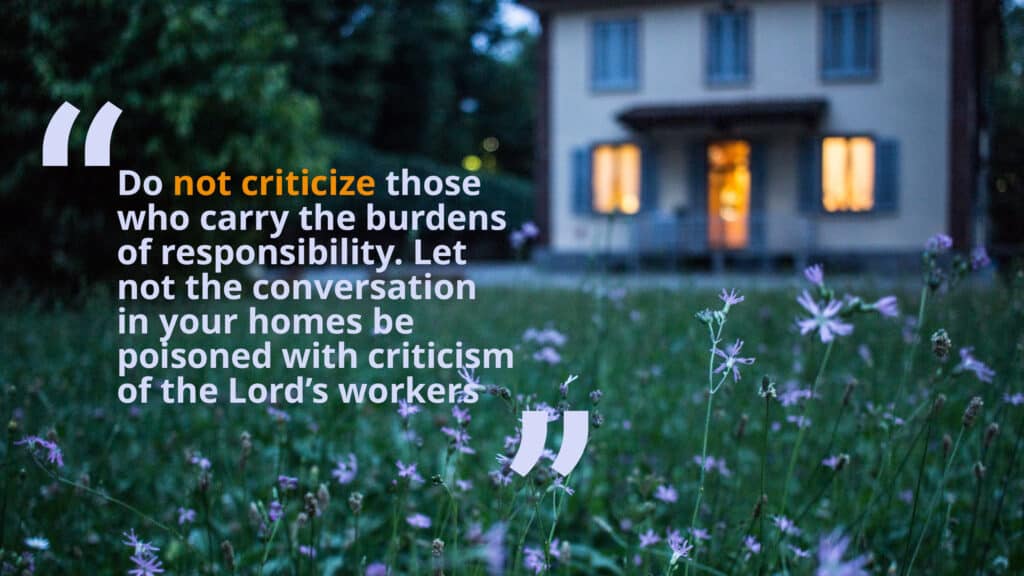As a co-founder of the Seventh-day Adventist Church, Ellen White made it a point to demonstrate biblical principles in all aspects of her life. She was a devoted wife to her husband James and a loving mother of four boys.
Because of the many things she learned during her fervent study of Scripture, she wrote many books, articles, letters, and more to help fellow Christians in their spiritual pursuits. She often wrote about applying God’s Word to everyday relationships.

Our faith should influence the way we interact with others, helping us become more considerate of people’s different needs.
We are all woven together in the great web of humanity, and whatever we can do to benefit and uplift others will reflect in blessing upon ourselves. The law of mutual dependence runs through all classes of society.((White, Ellen G., Patriarchs and Prophets, pp. 534-535 ))
Seeking the good of others made sense to her as we are all interconnected and part of a larger community.
Let’s look through the highlights of her counsel on biblical principles for interpersonal relationships. We will cover:
- Putting God first—the beginning step toward good relationships
- Biblical wisdom for family relationships
- How we should treat fellow believers
- How we should treat those that believe differently
- Our relationship with Jesus as a gauge for our earthly relationships
The way we treat people on a regular basis is part of how we spread the Gospel. So we’ll start by looking at how to make Jesus the center of our social and relational decisions.
Putting God First is the Beginning of All Good Relationships
Ellen White wrote that “the character of the Christian is shown by his daily life.”((White, Ellen G., The Sanctified Life, p. 80 ))

She reminded her readers of Matthew 7:17, when Jesus says good trees produced good fruit and bad trees produce bad fruit.
In this passage, Jesus compared himself to a vine and called those who followed Him “the branches.” Jesus challenged his followers to bear good fruit. And she believed this good fruit should show up in the simple things we do each day.
The good fruit was a natural result of being connected to Jesus, the vine. This is how the relationship between God and the individual is the beginning of all good relationships.
For example, as a consistent champion of practical Christianity, she believed the Bible taught the importance of giving other people the benefit of the doubt. After all, it’s impossible to know what another person is struggling with internally. Erring on the side of compassion, she thought it was important to focus on the good in others, not their faults. She made this point beautifully in her book, The Acts of the Apostles:
Christ-like love places the most favorable construction on the motives and acts of others. It does not needlessly expose their faults; it does not listen eagerly to unfavorable reports, but seeks rather to bring to mind the good qualities of others.((The Acts of the Apostles, p. 319 ))
It’s clear she was invested in seeing those around her in the best possible light. It’s easy to find flaws in others—but the challenge, as she saw it, was to see “motives and acts of others” as positively as possible, considering the reasons or motivations behind them, and to treat people accordingly. In this way, she helped position those around her for success.
And though she strongly encouraged cheerfulness and optimism as matters of Christian duty, she was grounded in reality. Through her own emotional low points due to personal illness, the deaths of her children, and other considerable discouragements, she knew even the strongest of Christians can struggle with depression. She had a very understanding approach:
If, under trying circumstances, men of spiritual power, pressed beyond measure, become discouraged and desponding, if at times they see nothing desirable in life, that they should choose it, this is nothing strange or new. … Those who, standing in the forefront of the conflict, are impelled by the Holy Spirit to do a special work, will frequently feel a reaction when the pressure is removed. Despondency may shake the most heroic faith and weaken the most steadfast will. But God understands, and He still pities and loves.((White, Ellen G., Prophets and Kings, pp. 173-174 ))
And she cautioned fellow Christians not to engage in critical, fault-finding approaches to interpersonal communication. In 1886 she appealed:
May God help us to have a sense of our own shortcomings, and put away the criticism and severity which we have woven into our characters. … Oh, how wearied Christ must be with our stupidity, our disobedience, our oft rebellion, and yet He does not give us up.((White, Ellen G., Letter 19, 1886))
The devil is great at throwing accusations and criticisms our way, attempting to make us feel like we’re not worthy of the love of Christ. So she made extra effort to use the counsel of the Bible to encourage one another, helping everyone discover their value as a child of God.
Biblical Wisdom for Family Relationships
A warm, positive family life was a huge priority for Ellen White. She was deeply interested in doing a good job as a wife and a mother and wrote extensively about how family members should treat each other in line with Scripture.

This concern led her to advocate a “first things first” approach. She wanted families to reject the distraction of what their friends, neighbors, and others might think and focus on what really matters—the well-being of each member of our families:
Too many cares and burdens are brought into our families, and too little of natural simplicity and peace and happiness is cherished. There should be less care for what the outside world will say and more thoughtful attention to the members of the family circle.((White, Ellen G., The Adventist Home, p. 108 ))
There should be less display and affectation of worldly politeness, and much more tenderness and love, cheerfulness and Christian courtesy, among the members of the household.((White, Ellen G., Testimonies for the Church, vol. 4, p. 621))
She saw the need for a simple, straightforward family life, in which parents make themselves available and approachable:
Many need to learn how to make home attractive, a place of enjoyment. Thankful hearts and kind looks are more valuable than wealth and luxury, and contentment with simple things will make home happy if love be there.((White, Ellen G., Testimonies for the Church, vol. 4, p. 621))
In a nutshell, she wanted families to focus on what mattered: love and nurture. Not the shiny distractions of wealth and luxury, or the constant pressure of keeping up with neighbors and chasing status symbols.
She wanted the family home to be a protected, “sacred place, a symbol of heaven.” This would allow for family members to feel “ease, restfulness, trust.”((The Adventist Home, p. 177 ))
This protected place could be safeguarded by avoiding squabbles and clashes over differences of opinion:
Let the husband and wife remember that they have burdens enough to carry without making their lives wretched by allowing differences to come in. Those who give place to little differences invite Satan into their home. The children catch the spirit of contention over mere trifles. Evil agencies do their part to make parents and children disloyal to God.((The Adventist Home, p. 178 ))

But she also wanted to make it clear that if the family priorities get derailed, or if tough times shake up the normal balance, honesty and humility can help set things right again. Like all human beings, despite her wonderful qualities and incredible work, she would make mistakes from time to time, even in her most intimate relationships. She wasn’t afraid to acknowledge this and apologize.
In regard to infallibility, I never claimed it; God alone is infallible. His Word is true, and in Him is no variableness, or shadow of turning.((White, Ellen G., Selected Messages, Book 1, p. 37 ))
She also modeled a humble attitude in her marriage, acknowledging her mistakes and seeking to make things right.
In a letter to James on May 16, 1876, five years before he passed away after serious health problems, Ellen told her husband how sorry she was about the way she’d handled some things.
It grieves me that I have said or written anything to grieve you. Forgive me and I will be cautious not to start any subject to annoy and distress you. We are living in a most solemn time and we cannot afford to have in our old age differences to separate our feelings.
I may not view all things as you do, but I do not think it would be my place or duty to try to make you see and feel as I feel. Wherein I have done this, I am sorry. I want a humble heart, a meek and quiet spirit. Wherein my feelings have been permitted to arise in any instance, it was wrong.((White, Ellen G., Letter 27, 1876 ))
This tenderness, loyalty, and affection between Ellen and James endured through thick and thin. The couple lived most of their married life in poverty, often suffering from health issues. They endured the tragic death of two sons, and James’ strokes. And their pioneering work of publishing and preaching and sharing the Gospel often suffered setbacks.
But through it all, she clearly believed in sticking by your spouse through thick and thin. After James passed away, she summarized their life together like this:
…We have been united in labor for thirty-six years… but I can lay my hands upon his eyes and say, “I commit my treasure to Thee until the morning of the resurrection.”
I feel that he is the best man that ever trod shoe leather.((White, Ellen G., Manuscript Releases, Vol. 5, p. 208 ))
Should anything be different in how we treat fellow believers?
There is a special kind of bond between people who hold common spiritual beliefs. It creates a community. And in this kind of context, it’s especially important to be intentional about cultivating healthy relationships. It’s often been said that the way we treat our own family members (especially when we don’t think anyone notices) reveals our inner character. Well, the same can be said for how we treat our spiritual brothers and sisters in our faith community.

In Colossians 3:12-14, Paul speaks of the warm ties that should bind believers:
Therefore, as God’s chosen ones, holy and dearly loved, put on compassion, kindness, humility, gentleness, and patience, bearing with one another and forgiving one another if anyone has a grievance against another. Just as the Lord has forgiven you, so you are also to forgive. Above all, put on love, which is the perfect bond of unity” (CSB, emphasis added).
Ellen White knew that we must keep this kind of Christian peace. She promoted harmony among believers and rejected envy, suspicion, and or taking advantage of others:
There is no surer way of weakening spirituality than by cherishing envy, suspicion, fault-finding, and evil surmising. On the other hand, the strongest witness that God has sent His Son into the world is the existence of harmony and union among men of varied dispositions who form His church.((The Acts of the Apostles, p. 549 ))
She felt that many secret, hidden, toxic attitudes were so harmful that she described them as the easiest way to damage a Christian’s life.
She was especially concerned about how believers talked about their leaders. The unproductive fault-finding was especially destructive when it was directed at those who had been chosen to lead fellow believers:
Do not criticize those who carry the burdens of responsibility. Let not the conversation in your homes be poisoned with criticism of the Lord’s workers.((White, Ellen G., Counsels for the Church, p. 178 ))

To further drive this point home, she cautioned parents to watch that they don’t model this behavior in front of their children.
Parents who indulge this criticizing spirit are not bringing before their children that which will make them wise unto salvation. Their words tend to unsettle the faith and confidence not only of the children, but of those older in years.((White, Ellen G., Testimonies for the Church, vol. 7, p. 183))
It seemed that she felt she couldn’t emphasize it enough. People who tore down leaders with their words and poisonous attitudes were not just difficult to be around, but they shook the foundations of faith in others.
Instead of critiquing, she suggested setting others up for excellent work by speaking positively about them—even when it becomes necessary to express disagreement. She warned people to be careful about what they said about other believers, as these words would reflect back on God and what He was doing within the community of believers.
Let those who fear God and believe the truth put a guard on their lips. Let them be determined not to speak words that will injure the cause of God, or give a wrong representation of the work being done in any of His institutions.((White, Ellen G., The Voice in Speech and Song, p. 146 ))
Negativity was a threat that could derail the important work believers are called to do. She continued this thought:
Let them be careful not to speak words that will be a temptation to someone else to withhold the confidence and the words of courage that ought to be given to those who have been severely tried, and who, perhaps, have been working early and late to fulfill the many calls of duty coming to them, until it seems as if the mind would give way under the strain.
Often, at such times, false impressions regarding such workers are made on minds by cruel words, full of surmisings. The seeds of suspicion and distrust, like thistledown, are carried far and wide, and can never be gathered up.((White, Ellen G., The Voice in Speech and Song, p. 146 ))
She also did not shy away from holding believers to a higher standard. Through personal letters as well as general advice to fellow Christians, she did not hesitate to be clear on what was or was not acceptable Christian behavior.
Negativity can spread so easily—and it’s difficult to undo its damage.
So she suggested deliberately cultivating constructive, loving relationships with fellow believers.((White, Ellen G., The Ellen G. White 1888 Materials, p. 1087 ))
She called for believers to “meet together once or twice a week, and with humble minds, feeling their weakness and realizing their defects… ask the Lord to enlighten their understanding and fill their hearts with His love.”((White, Ellen G., Manuscript Releases, vol. 11, p. 261 ))
This means deliberately cultivating community in a context of love and humble behavior. And while it seems simple and obvious enough, we all know how hard that can be in reality. So she felt that a consistent reminder was needed about being cheerful in our interactions with others, noting how it’s part of the Christian lifestyle of service encouraged by Christ.
We should bring the attractiveness of Christ into our Christian service. The soft beams of the Sun of Righteousness should shine into our hearts, that we may be pleasant and cheerful, and have a strong and blessed influence on all around us. The truth of Jesus Christ does not tend to gloom and sadness.((The Ellen G. White 1888 Materials, p. 1088 ))
Check out these free Bible studies to learn more about Jesus and His unfailing love.
How to treat those who don’t share your faith or culture
Ellen White also made sure to discuss how we should engage with people who believe differently, or who come from vastly different backgrounds. She began by reiterating how important it is to follow Christ’s example.

And living out this kind of example isn’t just a matter of willpower. She felt that in order to reflect the grace and love of Jesus, it was important to spend time studying the Bible and praying to God for guidance in this area:
They can present to unbelievers proof of the fullness of grace and love which is in Christ. Thus they become complete in Him. Such men acquire an education by prayer and earnest soul hunger. As they eat the words of Christ, the treasure house of the mind is filled with precious truths, from which they can draw to supply the needs of others. They know how to lead. They can teach others, relating to them their own experience.((White, Ellen G., Letters and Manuscripts, vol. 16, p. 1.4340 ))
It makes sense—you can’t teach others about things you haven’t studied or experienced for yourself. Repeating things you heard second-hand will have little more than a surface-level effect. But as we dive deeper into our own studies of Scripture, and prayerfully nurture our walk with God, we will have much to say. And it will mean so much more because we’ve tested it all through our own experiences.
We’ll also be more in tune with the voice of the Holy Spirit, who can bring things to our minds at just the right times.
She also emphasized the importance of meeting people where they are. Through the process of getting to know the paths others are on, we are more able to attend to their needs and be the kind of companion they would benefit from. And sometimes, just a listening ear can be exactly what they need to open their hearts.
Here’s how she described the work of the apostle Paul:
…the apostle varied his manner of labor, shaping his message to the circumstances under which he was placed.((White, Ellen G., Gospel Workers, p. 118))
Just as Paul adjusted his approach to people based on their circumstances and culture (I Corinthians 9:20-23), she believed we can do our best to help people in a way that connects to their context.
And she made sure to note that “the laborer for God is to study carefully the best methods, that he may not arouse prejudice or combativeness.”((White, Ellen G., Gospel Workers, p. 118)) The way we share truth shouldn’t inadvertently create barriers or turn people off during the first few interactions. And she had words for those who were careless in this area:
By following their natural inclinations, they have closed doors through which they might, by a different method of labor, have found access to hearts, and through them to other hearts.((White, Ellen G., Gospel Workers, p. 118))
Interacting with people who don’t share your faith or culture requires putting them first. Focusing on differences, or an “us vs. them” approach, has never been an effective way to draw people in. It just doesn’t work. No matter what a person’s beliefs are, they always have reasons for believing them. And if we don’t respect those first, they won’t respect us.
How our relationship with Jesus affects our relationships with others
On a fundamental level, Ellen White believed our relationships with Jesus influenced every other relationship in our lives. It was the key that unlocked positive, loving human behavior.

Brethren, will you carry the spirit of Christ with you as you return to your homes and churches? Will you put away unbelief and criticism? We are coming to a time when, more than ever before, we shall need to press together, to labor unitedly. In union there is strength. In discord and disunion, there is only weakness.((White, Ellen G., Selected Messages, Book 2 , p. 373 ))
This “spirit of Christ” she talked about was the great enabler of good things. It’s what allows people to put away the negativity that so often clouds human vision so we can focus on a positive team spirit. A strong relationship with Jesus will naturally foster unity. But losing sight of Jesus just leads to division—and this was a major source of weakness that she noticed.
God never designed that one man, or four, or twenty, should take an important work into their own hands, and carry it forward independently of other workers in the cause. God wants his people to counsel together, to be a united church, in Christ a perfect whole.((White, Ellen G., General Conference Daily Bulletin, April 13 issue, 1891))
And rather than being distracted by our own preferences and biases, she encouraged everyone to sincerely seek God’s will for their lives.
The only safety for us is to enter into the counsels of Heaven, ever seeking to do the will of God, to become laborers together with him. No one company is to form a confederacy, and say, “We are going to take this work, and carry it on in our own way; and if it does not go as we want it to, we will not give our influence to have it go at all.” This is Satan’s voice, not God’s. Do not obey such suggestions.((White, Ellen G., General Conference Daily Bulletin, April 13 issue, 1891))
True believers who love Jesus and want to follow Him need to be careful about disagreements. A strong relationship with Jesus means making a real effort to avoid unhealthy divisions and drama. Getting this wrong has serious consequences:
Here is a lesson to the followers of Christ, that they should take every proper precaution to avoid disagreement; for in every division of interest, resulting in disputation and unhappy differences in the church, souls are lost that might have been saved in the kingdom of Heaven.((White, Ellen G., The Spirit of Prophecy, Vol.2, p. 139 ))
The last thing believers want to do would be to discourage unbelievers and contribute to their doubts. But even when individuals have the best of intentions, when “unhappy differences” in the community aren’t addressed and mended, they threaten to divide believers.
Ellen White felt everyone should be exactly who God had made them to be. Having a loving relationship allowed you to let people be their authentic selves—true to how God created them. Trying to silence people and rob them of their uniqueness was not at all what Christians should be doing.
No one has the right to destroy or submerge the individuality of any other human mind, by uttering words of criticism and faultfinding and condemnation.((White, Ellen G., The Upward Look, p. 216 ))

According to White, a true believer in Jesus has a responsibility to show patience under fire. She advocated a sense of calm cheerfulness even under the worst circumstances. Here’s how she put it:
Patience as well as courage has its victories. By meekness under trial, no less than by boldness in enterprise, souls may be won to Christ. The Christian who manifests patience and cheerfulness under bereavement and suffering, who meets even death itself with the peace and calmness of an unwavering faith, may accomplish for the gospel more than he could have effected by a long life of faithful labor.((The Acts of the Apostles, p. 465 ))
Let that sink in for a second. She was saying here that being an example of Christian patience and cheerfulness, even in the face of something as horrible as tragedy or even death, could make more of an impact for good than a lifetime of work. That’s a pretty persuasive argument for cultivating a sense of calm, patience, and trust in God—even in the worst of times.
The way we act toward others matters—plain and simple. So Ellen White gave practical advice for improving and cultivating relationships. She encouraged people to seek the good of those around them in a cheerful, humble way that provided companionship instead of condescension.
That’s why she wrote so much on the subject. In offering such guidance she showed she was a strong believer in making faith relevant in day-to-day life. She was encouraging believers to put biblical principles for positive interpersonal relationships, into practice. She knew that even long-time Christians need reminders or encouragement to maintain their walk with Jesus, so that those around them could tell they were believers.
And she practiced what she preached. In sickness and health, in good times and bad, Ellen White treated people with kindness, love, and patience—and sincerely apologized if she fell short. Her writings wouldn’t have had such an enduring effect if she hadn’t lived according to the Bible herself.
Ellen White saw Jesus as her closest companion throughout life. And this most important relationship brightened every other relationship she had. She followed the Holy Spirit’s leading and sought to point people toward Jesus, which then could have ripple effects within every individual.
Want to invigorate your interactions with others? Find out what the Bible teaches about interpersonal relationships by starting a free Bible study.
